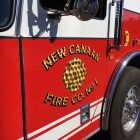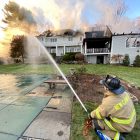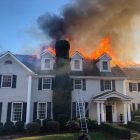Fred Baker
New Canaan Fire Marshal Fred Baker To Retire Friday
|
Fred Baker, one of New Canaan’s most visible and experienced public safety professionals, is set to retire at the end of this week. After more than a dozen years as New Canaan’s fire marshal and nearly a half-century in the field, the new grandfather will step down from a position with which he’s become synonymous here. “I’m feeling great,” the mustachioed Redding resident told NewCanaanite.com when asked for his thoughts on retirement. “I’m looking forward to it. I’ve been in the fire service, as they call it, for 47-plus years, and I’m looking forward to doing my projects at home—puttering at home.



